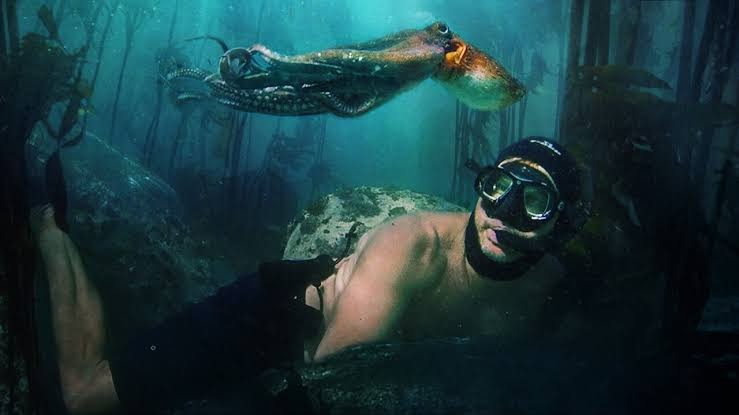I made it to the theatre once in 2020. (And that was a
dud – more later.) The bottom line is that I barely saw ten 2020 releases, let alone choosing ten for “top ten” list.
What I will do instead is write about seven impressive films
from this past year in a non-ranked order. And, as usual, I will also suggest a
couple of honourable mentions and a few older films I saw this year that are worth recommending.
Three of the most notable films were documentaries. One of those was My
Octopus Teacher, one of the few
films that I reviewed earlier this year. It’s utterly unique, combining a beautifully
shot underwater world with subtly luminous moments of contemplative insight. In
a year filled with strange stresses and tensions, it was a perfect counterpoint
and is much recommended.
The other documentary that I’ll mention is The New
Corporation. This team’s first documentary, The Corporation, was the
film that effectively called out the psychopathic nature (by practice and by
legal necessity) of corporations. Now, they update their message by
demonstrating the new face of the same old psychopathy among the “new
corporations.” The new corporate emphasis on dangerously disingenuous charm, posing
as though they are the best hope for the world, is surprisingly consistent with the psychopath
diagnosis. Greenwashing and the myth of “corporate social responsibility” are just
the surface; the corporate takeover of education in the developing world felt
the most chilling. This isn’t the most scintillating entertainment in the
world, but it’s solid quality and necessary education for all.
In between these two documentaries is David Attenborough’s A
Life on Our Planet. The autobiographical form of this documentary gives it
some of the personal appeal of My Octopus Teacher and adds a moving and
effective urgency that is different from numbers alone, as we see the changes
that have taken place during one attentive lifetime. The central portion of
this film is hard-hitting – not for the faint of heart – but the ending,
thankfully, adds some hope and optimism.
A couple of other very impressive films focused on court
cases involving the fight for justice. The energetic and witty script of The
Trial of the Chicago 7 saw Aaron Sorkin’s magic make an intense film (based
on the trial of those falsely accused of conspiring to make the demonstrations
violent at the 1968 Democratic National Convention) very watchable and
entertaining. Of course, it also reflects Sorkin’s tendency to make a radical
message more palatable to the mainstream, but I think there is some value in
that – especially when others portray the grittier realities.
And Mangrove (part of the Small Axe film
anthology by Steve McQueen) steps into this gap perfectly. This film depicts
the struggle of the West Indian community in London to stand up against police
harassment in 1970. While in many ways this depicts a similar court struggle, Mangrove
centres racial hypocrisy (the West Indian community had been specifically
invited to immigrate post-war) and the growing urgency for this community to
come together and find their voice. In Mangrove, the energy comes less
from fast and witty dialogue (though it is still a strong script) and more from
the various life-giving threads within the West Indian community being woven
together around a centre of food, music and socializing at the Mangrove restaurant.
Watching the film, I couldn’t help but recall some recent wandering (in 2016
and 2018), when Carol and I saw the life of recent immigrant communities spill
out into the streets of Paris (in edges of Montmartre and Belleville). I wonder
about their struggles with police and other authorities.
Then there are two films worth recommending that star Carey
Mulligan (they couldn’t be more different from each other, underlining
Mulligan’s incredible acting range – though apparently the Dig has to
wait until next year’s list). This year’s film is Promising Young Woman,
a highly unique film that hits hard. I feel that even subtle spoilers are
sensitive here, and so I won’t say why (though I wish I could – maybe I’ll
write a spoiler-filled review at some point). Let’s just say that the film is
quite effective in doing what it sets out to do, and it is a syrupy sweet (at
times) gut-punch if that makes any sense. I understand there are some flaws,
though if one accepts it as a contrived moral tale, I think it works.
Finally, Ma Rainey’s Black Bottom is a powerful drama that
gives us Chadwick Boseman’s final,
and magnificent, performance with some
highly memorable monologues. I appreciate it when a filmmaker crafts a film that
maintains the feel of a play.
Blow the Man Down, two indie dramedies that are well worth watching,
giving us the depiction of characters and tales different from the mainstream
as good indie flicks should. And as I watched the first half of Nomadland,
I thought it would make my top list for sure, but then it just kind of wandered
away and lost me. But it still deserves an honourable mention.
Over this year, I caught up on a few older films that I’d
like to recommend: Just Mercy, And the Birds Rained Down, and from
several years back a film that I never got around to, but clearly should have: Departures.
And this wouldn’t be complete without pointing out at least
one disappointment: Tenet was a better film than those I usually add to
my “spilled coffee list,” but it was such a disappointment, especially since it
was the one film that I saw in a theatre. On top of serious plot problems, the
pathetic sound editing (unforgivably) made me feel like an old man who couldn’t
handle movie theatres anymore, until I heard Vic and others complain that
the sound was indeed a serious problem. How on earth does that kind of mistake happen when so many
millions are invested in a movie??
And now we brace for another year of the small screen…





